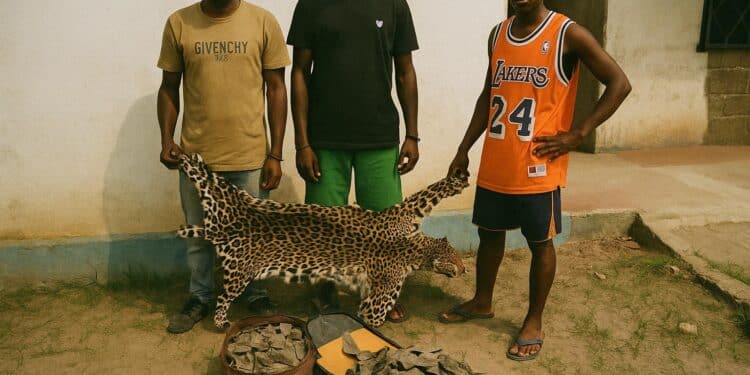A Swift Verdict Echoing Brazzaville Policy
Only a month separated the arrest of Jodel Mouandola, Arel Ebouzi and Parfait Mbekele from the moment a magistrate of the Tribunal de Grande Instance of Impfondo read the sentence that will confine them for up to three years. The celerity of the proceedings has been underlined by the Ministry of Justice as evidence of what one senior official calls an “irreversible culture of accountability” (Ministry of Justice communiqué, 28 June 2025). Far from a mere local anecdote, the judgment resonates with the national strategy articulated by President Denis Sassou Nguesso in his 2023 address to the African Union on combatting environmental crime, where he framed wildlife protection as a pillar of sovereign development.
Diplomatic observers stationed in Brazzaville remind that Likouala’s dense forests border both the Central African Republic and the Democratic Republic of Congo, a transboundary corridor long identified by INTERPOL as a high-risk route for illicit wildlife products. By acting rapidly in Impfondo, Congolese authorities are seen to pre-empt regional criticism over enforcement gaps and to reinforce the country’s standing before the next CITES reporting round.
Legal Architecture of Wildlife Protection
The backbone of the case is Law 37-2008, whose Article 27 places pangolins, panthers and a catalogue of other species under integral protection. The law grants only narrow scientific exemptions, and magistrates have gradually interpreted its wording with growing severity. According to the latest compendium of jurisprudence published by the National School of Administration and Magistracy, conviction rates for fauna offences have risen from 42 percent in 2015 to 71 percent in 2024.
In the Impfondo dossier, prosecutors relied on a chain of custody established by the Gendarmerie in cooperation with the Departmental Directorate of Forest Economy and the Project for the Application of Wildlife Law, better known by its French acronym PALF. The use of PALF’s forensic toolkit, including DNA bar-coding of seized scales, allowed the court to frame the crime not merely as local poaching but as a contribution to a transnational trafficking network—a legal nuance that justified the higher custodial sentences and an aggregate four million CFA francs in fines and damages.
Regional and International Implications
The verdict arrives at a moment of sharpened scrutiny from multilateral lenders that tie portions of climate-finance envelopes to verifiable progress in biodiversity conservation. An analyst at the African Development Bank, reached for comment, noted that “clear judicial outcomes build investor confidence that green funds will not be undermined by impunity” (AfDB field note, July 2025).
Equally salient is the diplomatic dialogue with the European Union, whose 2022 Action Plan against Wildlife Trafficking singles Congo-Brazzaville out as a cooperative partner. By substantiating that reputation in court, Brazzaville strengthens its negotiating position for preferential trade quotas under the Voluntary Partnership Agreement on Forest Law Enforcement. In that light, the Impfondo ruling functions as both a domestic legal milestone and a card in international bargaining.
Balancing Conservation and Community Livelihoods
Local civil society voices, while welcoming the decision, caution against overlooking socioeconomic drivers. Likouala ranks among the Republic’s most remote departments, where bushmeat still supports household protein intake. The Governor’s office has affirmed that alternative livelihood programmes, financed partly by the Green Climate Fund, will be expanded to Epéna and neighboring districts. Such measures aim to reduce the temptation that propelled Mouandola and his accomplices toward trafficking.
Scholars at Marien Ngouabi University further argue that effective conservation policy must integrate customary rights. Their forthcoming survey indicates that community-managed hunting zones have halved illegal offtake over a five-year window. The Impfondo case could, paradoxically, galvanise these participatory approaches by delineating the hard legal boundary that separates subsistence use from commercial exploitation.
Judicial Resolve and Diplomatic Signals
For the diplomatic community, the hard line taken by the court offers a textured reading of governance in Congo-Brazzaville. It illustrates an institutional willingness to apply statutory norms even in peripheral jurisdictions, thus reinforcing the narrative of state reach articulated in recent UN Sustainable Development Goal reports. While some regional NGOs propose even longer sentences to deter kingpins, seasoned observers note that disproportionate penalties could inflame local grievances and erode trust.
By calibrating punishment within the upper half of the statutory range yet coupling it with significant pecuniary sanctions, the court appears to have sought equilibrium between retribution, deterrence and societal cohesion. That balancing act, more than the length of the prison terms themselves, sends the clearest signal: the Republic of Congo intends to guard its ecological patrimony with legal instruments that are both firm and carefully weighted. Such judicial poise is likely to feature in upcoming bilateral dialogues on climate security, offering Brazzaville a persuasive example of law in action.











































